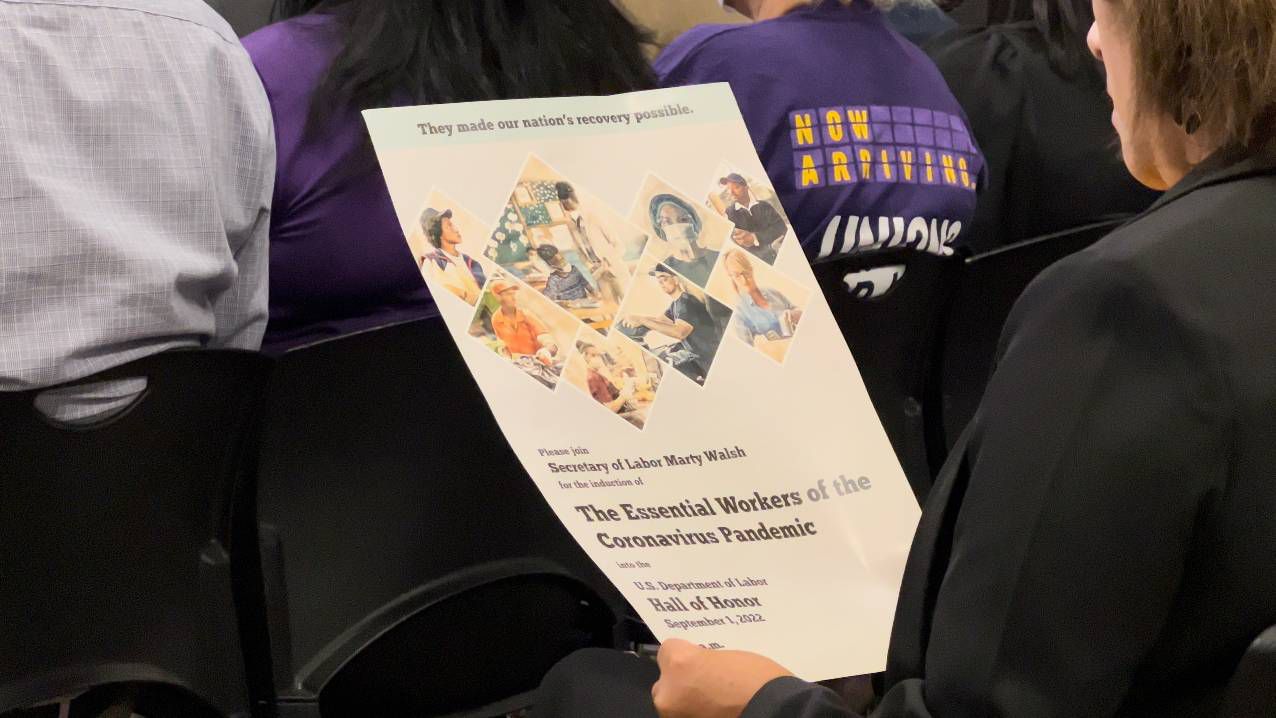The Department of Labor honored frontline workers across the country in a ceremony Thursday for their "sacrifices and continuous efforts" as they supported communities throughout the COVID-19 pandemic.
Officials inducted grocery workers, educators, maintenance, nurses, electricians and other essential workers to the Labor Department's Hall of Honor, a showcase that highlights "the life-changing contributions that a unique group of people have made on the American way of work."
“The Hall of Honor is about people who changed history, and that’s exactly what the essential workers of the coronavirus pandemic did for our country,” Labor Secretary Marty Walsh said during the ceremony.
“Today, we remember the essential workers who passed away during the pandemic and honor the ongoing labor of all essential workers," Walsh said. Walsh expressed his gratitude for having "the chance to thank some of them in person."
The Hall of Honor began in 1988 to “honor those Americans whose distinctive contributions in the field of labor have elevated working conditions, wages, and overall quality of life of America's working families.” The department has inducted notable groups of workers, such as the 9/11 rescue workers, the workers of the 1968 Memphis Sanitation Strike and the The Pioneers of the Farm Worker Movement, as well as leaders such as the late Sen. Ted Kennedy and former President Ronald Reagan.
“All across the country – in every community – our nation’s essential workers redefined what it truly means to show up for your neighbor,” Julie Su, Deputy Secretary of Labor said. “When everyone else was encouraged to stay at home to be safe, essential workers did not have that option.”
“So many of these essential workers had not signed up to be in jobs on the front lines of a crisis, yet they risked their lives to keep the rest of us safe, healthy, educated, and fed. They are heroes we depended on – and continue to depend on -- every day.”
The Deputy Secretary of Labor acknowledged how the world has come to “appreciate” how integral farmworkers are to our “economy and society” and the sacrifices they make “every single day.”
One of those workers recognized for their dedication is Carolina Sanchez of Delano, California, a farm worker who picks blueberries and grapes. For 18 years, Sanchez says she has been showing up to the fields each day at dawn to pick the food that eventually ends up on our tables.
Sanchez continued her work through the pandemic.
“During the pandemic, we had no right even to get sick. We had to think about feeding our families and also this country. For us farm workers, there is no help,” she said via a translator.
Sanchez says she didn't have union representation for her grape picking job like her blueberry job. Despite only one job offering her protections from COVID which included masks or temperature checks, she still showed up even when she was sick because she and along with others feared they would lose their job.
“I’ve decided I want to be a leader because I want my children to have this present in their lives. I want my children to one day do a little of what Mr. Cesar Chavez did," Sanchez said in her speech at the induction ceremony as her reason for getting more involved with union related activities. “He did a lot for us, the farm workers. He is a leader.”
Sanchez, who became emotional detailing the struggles of farm workers across the country, received a standing ovation for her speech.
Speaking to Spectrum News after the ceremony, Sanchez called on California Gov. Gavin Newsom to sign A.B. 2183, a measure that would change the rules for how union elections are held for farm workers.
“I would like for farmworker voices to be heard for us to gain support,” Sanchez, told Spectrum News. “Currently we are in a fight with the governor of California. We’re asking him to sign legislation in California to recognize us as farm workers.”
The bill would make it easier for farmworkers to vote in union elections by allowing them to mail or drop off their ballots to a relevant Agricultural Labor Relations Board (ALRB) office, rather than voting in person on a grower’s property.
Governor Newsom vetoed a similar bill last year, saying the measure contained various inconsistencies and procedural issues. The United Farm Workers (UFK) said they have been working with his office and have made compromises including a new five-year sunset clause recently added to the bill. Mail-in voting and other provisions will expire in 2028 unless lawmakers vote to continue them.
“When he asked us for our help, we did everything possible so he could be elected and now we're asking for his help,” said Sanchez. “He should recognize all the Campesinos, the farmworkers, who walked so many miles - let him see the pain and suffering, the sacrifice, everything we have done to get to him [in Sacramento],” she added, referencing a 24-day, 335-mile march by California farm workers to the state’s capitol.
It’s a similar trek to that of Cesar Chavez, who founded the UFK workers union.
“I ask this from the bottom of my heart,” pleaded Sanchez. “You asked us to support you, and now we ask for your support.
To watch the entire program, click here.



